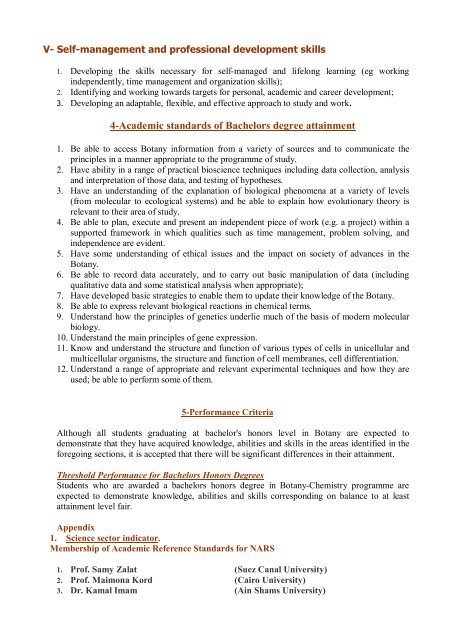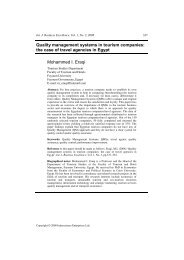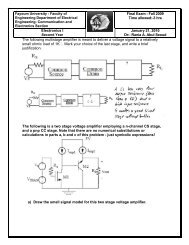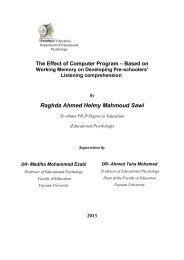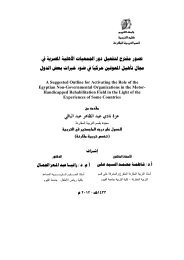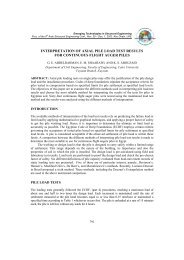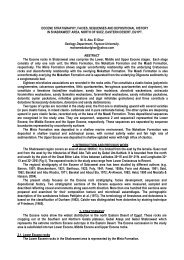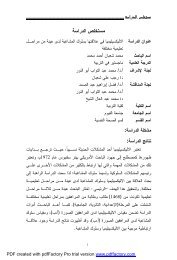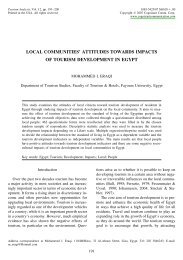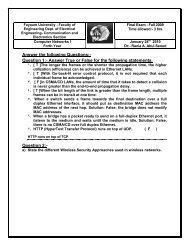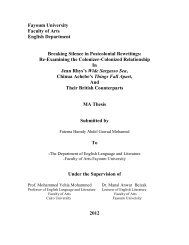National Academic Reference Standards for honors degree
National Academic Reference Standards for honors degree
National Academic Reference Standards for honors degree
You also want an ePaper? Increase the reach of your titles
YUMPU automatically turns print PDFs into web optimized ePapers that Google loves.
V- Self-management and professional development skills<br />
1. Developing the skills necessary <strong>for</strong> self-managed and lifelong learning (eg working<br />
independently, time management and organization skills);<br />
2. Identifying and working towards targets <strong>for</strong> personal, academic and career development;<br />
3. Developing an adaptable, flexible, and effective approach to study and work.<br />
4-<strong>Academic</strong> standards of Bachelors <strong>degree</strong> attainment<br />
1. Be able to access Botany in<strong>for</strong>mation from a variety of sources and to communicate the<br />
principles in a manner appropriate to the programme of study.<br />
2. Have ability in a range of practical bioscience techniques including data collection, analysis<br />
and interpretation of those data, and testing of hypotheses.<br />
3. Have an understanding of the explanation of biological phenomena at a variety of levels<br />
(from molecular to ecological systems) and be able to explain how evolutionary theory is<br />
relevant to their area of study.<br />
4. Be able to plan, execute and present an independent piece of work (e.g. a project) within a<br />
supported framework in which qualities such as time management, problem solving, and<br />
independence are evident.<br />
5. Have some understanding of ethical issues and the impact on society of advances in the<br />
Botany.<br />
6. Be able to record data accurately, and to carry out basic manipulation of data (including<br />
qualitative data and some statistical analysis when appropriate);<br />
7. Have developed basic strategies to enable them to update their knowledge of the Botany.<br />
8. Be able to express relevant biological reactions in chemical terms.<br />
9. Understand how the principles of genetics underlie much of the basis of modern molecular<br />
biology.<br />
10. Understand the main principles of gene expression.<br />
11. Know and understand the structure and function of various types of cells in unicellular and<br />
multicellular organisms, the structure and function of cell membranes, cell differentiation.<br />
12. Understand a range of appropriate and relevant experimental techniques and how they are<br />
used; be able to per<strong>for</strong>m some of them.<br />
5-Per<strong>for</strong>mance Criteria<br />
Although all students graduating at bachelor's <strong>honors</strong> level in Botany are expected to<br />
demonstrate that they have acquired knowledge, abilities and skills in the areas identified in the<br />
<strong>for</strong>egoing sections, it is accepted that there will be significant differences in their attainment.<br />
Threshold Per<strong>for</strong>mance <strong>for</strong> Bachelors Honors Degrees<br />
Students who are awarded a bachelors <strong>honors</strong> <strong>degree</strong> in Botany-Chemistry programme are<br />
expected to demonstrate knowledge, abilities and skills corresponding on balance to at least<br />
attainment level fair.<br />
Appendix<br />
1. Science sector indicator.<br />
Membership of <strong>Academic</strong> <strong>Reference</strong> <strong>Standards</strong> <strong>for</strong> NARS<br />
1. Prof. Samy Zalat (Suez Canal University)<br />
2. Prof. Maimona Kord (Cairo University)<br />
3. Dr. Kamal Imam (Ain Shams University)<br />
٢٣


